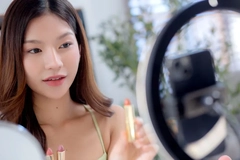Menstrual disc demand: Bodyotics expands in Europe as reusable period care rises

Finnish brand Bodyotics is expanding the retail presence of its best-selling menstrual discs across Europe, following a 200% year-on-year sales increase. The company is now moving beyond online marketplaces to reach consumers via broader retail distribution after reported success on Amazon Germany over the past 12 months.
Personal Care Insights speaks with Joanna Pepper-Koskimo, head of Beauty and Wellness at Bodyotics’ holding company, eBrands, about the discs and how menstrual care is changing in the industry.
“Most people still use single-use products, but we are seeing a shift. Cups were really the first reusable option to break through. However, cups rely on suction, and many users find that uncomfortable. Discs do not use suction — they sit at the base of the cervix and stay in place anatomically,” she explains.

“Discs can also be worn longer and offer good leak protection. Plus, you can use them during sex, which you cannot do with a cup. So while there is space in the market for all types — cups, single-use, and discs — we are seeing more interest in discs based on recent research and consumer feedback.”
Bodyotics aims to address sizing concerns by offering two-size kits, helping users find their fit and “build confidence” with reusable products.
Expansion amid demand
Bodyotics’ expansion will target the Nordic countries, Germany, France, Italy, the UK, and Spain. Its existing retail partners include OTTO (Germany), Ecco Verde (Austria), Ruohonjuuri (Finland), and duty-free airport shops. The brand aims to grow its overall business by 26% in 2025.
“On Amazon, we’re already present in the US, Canada, and several European countries. In retail, we’re in the Nordics and expanding rapidly. The DACH market — Germany, Austria, Switzerland — is a focus, as well as France, the EU overall, and the UK,” says Pepper-Koskimo.
“Retail expansion takes time. But we’ve already worked in these markets with other brands, so we’re building from a strong base. Online retail remains crucial too, often paving the way for brick-and-mortar opportunities.”
While Pepper-Koskimo notes that “online is faster, and it’s where we’re strongest,” she adds that getting into physical retail takes time, “but once you are visible online, it often helps secure shelf space in physical stores.”
“Consumers are used to buying period products at grocery stores and pharmacies. But sustainable products haven’t historically been stocked in those places. That’s changing. Consumers are asking for them, and retailers are responding.”
“Even though the product lifetime is longer, the value per item is higher, so there is still strong business potential for retailers,” she says.
.jpg) Bodyotics aims to address sizing concerns by offering two-size kits.Bodyotics says it identified the opportunity early through market trend tracking, supported by eBrands’ platform. The platform’s AI-driven Apollo tool and insights from other wellness brands helped the company scale quickly across channels.
Bodyotics aims to address sizing concerns by offering two-size kits.Bodyotics says it identified the opportunity early through market trend tracking, supported by eBrands’ platform. The platform’s AI-driven Apollo tool and insights from other wellness brands helped the company scale quickly across channels.
“It is a big market, and ultimately the consumer will decide. But the variety and availability of options will push reusable products forward,” she concludes.
Sustainable menstrual care
Last year, a UC Berkeley, US, study found several toxic metals, including lead and arsenic, in organic and inorganic tampons from various brands. This sparked online conversations about the safety of these disposable products, and whether reusables might be a better option.
Spotlighting a trend in disposable-product innovation, Pepper-Koskimo says: “There is a move toward biodegradable materials, which is hugely important right now.”
“Sustainable products currently represent about 30% of the market, but I hope in ten years that will flip to 70% sustainable and 30% single-use.” She adds that safety, sustainability, and comfort “are no longer just ‘nice to have’ — they are baseline expectations now.”
“Period products are intimate, so they must be safe. Sustainability is a top concern for Gen Z, especially. And comfort is essential. Nobody wants to have a certain time of the month when they cannot live life to the fullest.”
“Transparency is crucial,” Pepper-Koskimo says. “Our discs are made of high-quality medical-grade silicone and manufactured in China at one of the world’s leading facilities for that material.”
Formats taking stage
Many menstrual care solutions were once taboo but have become more conventionally accepted over time.
“In terms of product innovation, period underwear has become quite mainstream — what started as a trend is now going more into the everyday. There has also been development in absorbent technology, and these products are now looking nicer, even luxurious or sexy,” says Pepper-Koskimo.
Manufacturers are innovating in reusable period care, resulting in thinner, more invisible fabrics for period underwear.
“Another big trend is cross-category innovation. At Bodyotics, we combine menstrual care with intimate wellness — for example, products for pelvic floor training. So we are blending categories, which consumers seem to appreciate,” she reports..jpg) Many menstrual care solutions were once taboo but have become more conventionally accepted over time.
Many menstrual care solutions were once taboo but have become more conventionally accepted over time.
Tackling taboos
While innovation in the product category is rising, Pepper-Koskimo explains that there is still a prominent stigma surrounding the topic of menstruation and menstrual care.
“We want to normalize the conversation around the entire life cycle of the vagina. Even that word, ‘vagina,’ is taboo for many people to say out loud. But we’re positive and bold in our storytelling,” she says.
“Millions of women are experiencing menstruation at this very moment. We want to be their partner from the start of menstruation, through potential pregnancy, post-pregnancy, and into menopause.”
“I think personalization is the big shift ahead. Everyone’s body is different. Your cervix height and body changes over time — these things make sizing hard to predict. That is why we offer two size kits: small and large. That way, users can try both and find their fit.”
Additionally, Pepper-Koskimo notices a shift toward holistic wellness, especially in supporting the pelvic floor. “This is about more than menstruation. It is about lifelong intimate health, including managing incontinence, which is another area typically dominated by single-use products.”













